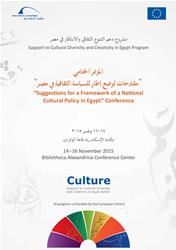Visions of a General Framework for Egypt’s Cultural Policy at the Closing Conference of the Support to Cultural Diversity and Creativity in Egypt Project
Posted on

The BA hosted the closing session of the Support to Cultural Diversity and Creativity in Egypt project conference on Monday, 16 November 2015. The project, which launched its activities in November 2013, is a collaborative project between the BA and the European Union, initiated to develop cultural life in Egypt.
During the conference, the draft of the Visions of a General Framework for Egypt’s Cultural Policy was presented. Among the attendees were intellectuals and thinkers working within the cultural field. They also presented their views and opinions on the proposals to be taken into consideration while finalizing the last draft of Egypt’s Cultural Policy.
The draft comprised eight pillars: Primary Overview, The Current Cultural State of Affairs, Cultural Reform in Egypt, Institutions and Mechanisms, Funding, The Digital Revolution and How to Deal with It, Implementation and Follow-Up, and a Conclusion.
The draft emphasizes that Egyptian cultural reformation is the key to reconstructing the contemporary Egyptian character so that it would be more open to plurality and more accepting of the other opinion; believe in rationality and the scientific approach; have an amount of scientific culture; possess great historical and cognitive knowledge; and become well-informed of what is happening around the world. In addition, it is important to reconstruct Egypt’s image as a state on the local, regional, and international levels.
Among the significant issues discussed in the draft are the importance of fostering youth; develop cultural institutions; review cultural legislations; openness towards regional and global cultures; using modern technology in promoting and disseminating culture; paying attention to the culture of creativity and promoting freedom of expression; promoting and publishing translations of Arab cultural works into other languages and vice versa; nurturing children’s culture; enhancing and making good use of cultural palaces; taking inventory of all historical and archeological buildings in Egypt that require restoration and renovation; and issuing national cultural newsletters dealing with national history, folklore, and distributing free copies among university and school students.
To watch the video, please click here.